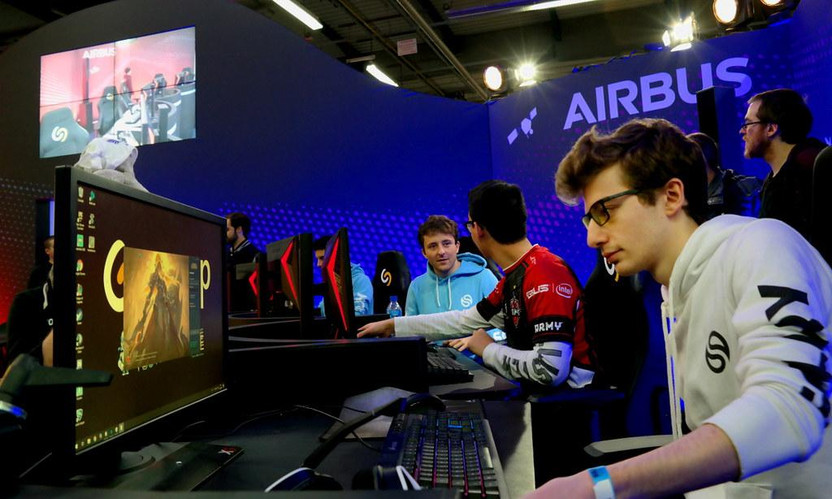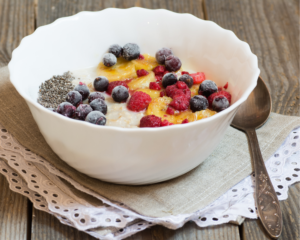Esports & Diet
Posted by amess on Jul 16th 2020
When it comes to esports and gaming in general, most people have an idea of what a typical gamer looks like, acts like, and eats like. We tend to think of them staying up all night eating pizza rolls, Hot Pockets, and Doritos and chasing them with energy drinks and Mountain Dew. While this is far from incorrect for many young people who game, there is much more interest surrounding nutrition and performance in terms of gaming than you may realize.
A Gamer’s Meal Plan
Nutrition for esports is becoming a popular search in many forums, including Reddit. However, players are often looking for “quick fixes” and cognitive boosts vs. a healthy meal plan. In fact, meal replacements are popular in the gaming community as the players often struggle to eat enough during the day, and most gamers are underweight. Eugene “Pobelter” Park, a professional League of Legends player for the team Immortals, struggles to meet his coach’s recommended 2300 calories a day. Immortals performance coach Robert Yip says,
“During the course of each day, they usually eat a calorie deficit, even if they’re having one huge meal a day. When players are hungry or tired or sick, they tend to play worse, and their stress management is a lot more difficult; they get more irritable.”
What the Pros Eat
When it comes to the professionals, the players competing at the highest levels are fairly well-versed in the importance of a healthy lifestyle for performance. One esports team, Counter Logic Gaming (CLG), decided to hire a team chef to help their players eat for better health and performance. Andrew Tye, a fine-dining chef with an extensive culinary background, was hired in 2016 to help the athletes sustain their energy during their 12-hour training sessions. Matt Nausha, head of eSports for CLG, says,
"This is why it’s important the players are well nourished to sustain optimal energy throughout the day. By providing meals, they can maximize their time to focusing on training."
Tye’s Recommendations
"Sustained energy" is why Tye suggests a high-protein, low-carb diet for players. "We don't avoid carbs completely since it’s one of the preferred sources of energy for our bodies, but having very carb-heavy meals can induce sleepiness, which we want to avoid." For this reason, a typical day might look something like eggs or oatmeal with fruit for breakfast, a whole wheat chicken wrap for lunch, and a decadent dinner for the players with “something colorful.” Brightly colored fruits and vegetables are often packed with important antioxidants.
What’s the Right Diet?
Along with Tye’s recommendations, there are several other suggestions out there. Besides the obvious “eat more fruits and vegetables and less processed foods,” we looked into some specific recommendations for esports athletes. While the Eatwell Guide recommends that men have around 2,500 calories a day and women around 2,000 calories a day, esports athletes tend to be more sedentary than the average person, so fewer calories are needed throughout the day. Like Tye, many nutritionists recommend a diet high in protein and low in carbs. Though we’d all love to have a personal chef, many of us are on our own when it comes to meals, which is why convenience is so important. However, Bora “YellOwStaR” Kim, former League of Legends professional player for Fnatic, strongly recommends cooking your own meals rather than finding the quickest option.
“If you can, cook your own meals so you know exactly what you’re eating. It’s a great idea to pick fresh foods and cook from scratch, that way you can avoid extra salt, sugar and flavorings which are typically added to ready meals.”
One website claimed that the best diet for esports is the Vertical Diet by Stan Efferding. This website then recommended the following foods:
- White rice

- Lean, high-quality red meat
- Salmon or other fatty fish
- Eggs
- Sweet and white potatoes
- Spinach
- Carrots
- Red pepper
- Greek yogurt
- Orange and cranberry juice
- Bone Broth
- Lara Bars (for snacks)
Along with eating foods that provide energy, many suggest choosing foods that have been shown to support cognitive function. Foods like blueberries, green tea, and leafy greens are all great for boosting alertness, memory, and focus. Believe it or not, the higher amounts of cocoa in dark chocolate can also help boost brain function, but it’s recommended to eat in small amounts since it is still chocolate.
Supplementation
Another common recommendation for those deficient in certain dietary nutrients is supplementation. While there are tons of options for supplements that boost performance, focus, cognitive function, abilities, etc., it’s important to understand the differences in quality and ingredient choices. Choosing a supplement with high-quality, dietary ingredients will not only lead to better outcomes, but it’ll be easier for the body to absorb and utilize. Additionally, athletes, in particular, should look for supplements that are NSF Certified for Sport. The certification signifies that the product has undergone an additional, more rigorous third-party testing process. This ensures that each box, bottle, or packet contains exactly what is promised on the label with no impurities or NCAA banned substances.
EyePromise Screen Shield Pro
One of the most important assets to a gamer is their eyes, but they are often overlooked when it comes to increasing performance. EyePromise Screen Shield Pro is designed to support the eyes during long hours spent on screen and help relieve associated symptoms like eye strain and fatigue, dry eyes, and headaches due to long-term screen exposure. This eye vitamin is made with the highest quality dietary ingredients and comes in a simple, one-a-day softgel and complements a daily multi-vitamin. Backed by 20+ years of eye health and nutrition research, its main ingredient, an antioxidant called zeaxanthin (zee-uh-zan-thin), has been shown to:
- Improve visual sharpness and clarity
- Improve contrast sensitivity
- Improve light sensitivity
- Improve reaction time
Learn more about Screen Shield Pro and upgrading your eyes. It’s clear that eating well and having a healthy lifestyle is beneficial in more ways than one. Like “traditional” athletes, esports athletes need to fuel their bodies and minds in preparation for a long match or the start of the split (what esports sometimes call seasons). A nutritionist or dietician is always the best source for creating a diet specific for a player’s/person’s needs, but eating more leafy greens and brightly colored fruits and vegetables is a great place to start!
Sources
- https://britishesports.org/news/keeping-fit-and-healthy-exercise-sleep-and-dietary-advice-for-esports-players/
- https://cyberathletiks.com/real-diet-and-nutrition-for-gamers-ultimate-guide/
- http://esportspow.com/esport-athlete-diet/
- https://www.menshealth.com/nutrition/a32903741/diet-esports-athletes/
- https://www.gq.com/story/the-real-life-diet-of-a-eugene-pobelter-park-professional-league-of-legends-player


